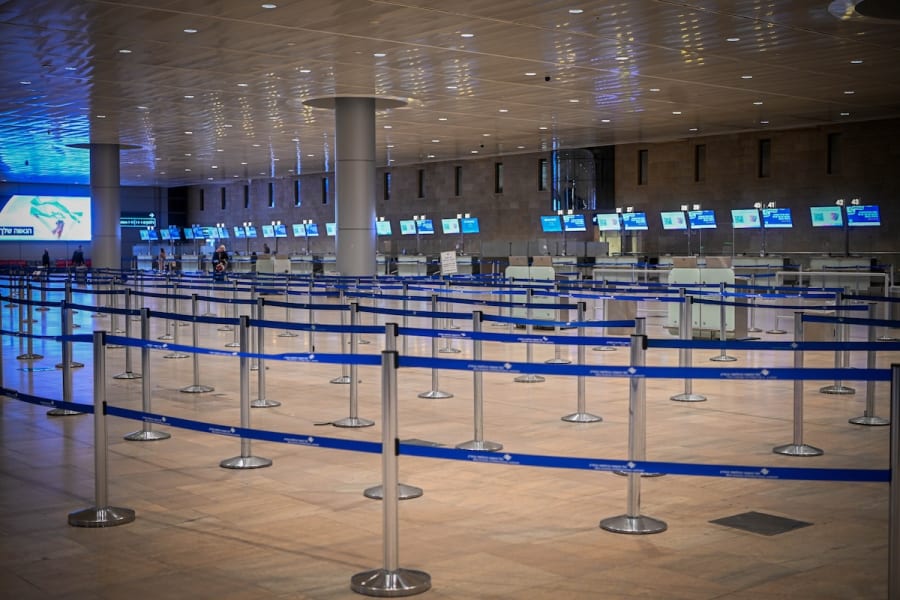Israel’s tourism sector once again in crisis amid war in Gaza
Tourism began to recover from the coronavirus pandemic in 2022 and 2023, and expectations were high before Oct. 7

Ever since the State of Israel suffered a brutal surprise attack by the terrorist organization Hamas on Oct. 7, incoming tourism has almost abruptly come to a halt and has continued until today, more than three months later. Foreign airline companies have systematically suspended their flights to Israel, except for the operational Israeli airlines.
On Oct. 30, the Hebrew-language financial news site Globes wrote: “Since the outbreak of the war, there has been an 80% decrease in the number of flights and an almost complete stop of incoming tourism. The industry is disturbed not only by the loss of income but also by the loss of professional workers and is asking the state for help in preserving them. The optimistic estimates speak of a return to normality only in the spring of 2024”.
The forecast by Globes was very optimistic, however, as most of the agents, tour guides and tourism experts only see Israel’s tourism sector coming back to life gradually at the end of 2024.
With an almost complete absence of tourists visiting Israeli sites, some airline foreign companies have returned to Israel in January 2024 but there are very few tourists on the streets of Israel.
The popular Holy Sepulchre and the Garden Tomb tourism sites in Jerusalem are almost empty, which is something only recently seen, back in 2020, during the COVID-19 pandemic – and before that, had almost never occurred in decades.
Some local tour agencies have, nevertheless, formed pilot tour groups composed of courageous “Israel lovers” – mainly Christians Evangelical tourists – this last month, but even so, it is still very embryonic.
While the missiles and rockets fire have almost completely ceased across most of Israel, and the war is being fought in the Gaza Strip or near Israel’s northern border with Lebanon – most travel agencies abroad do not recommend tourists visit Israel during this time. In addition, the lack of available rooms at hotels, due to the large quantity of Israeli evacuees who have been forced to relocate from areas close to Israel’s southern and northern borders, limits the possibility of bringing large groups of tourists from abroad.
The coronavirus pandemic was already a major and painful blow for Israel’s tourism, especially during the year 2020-2021, for all aspects of the tourism industry, including airlines, souvenir shops, restaurants, tourism sites, Israeli tour guides, hotels, transportation and bus drivers. The tourism sector had just slightly recovered somewhat during 2022 and 2023, and expectations were high, but once again fell into the abyss after the Oct. 7 Hamas atrocities.
According to Ynet news, and other official sources, during 2023 (and before Oct. 7), some 3,010,000 tourists arrived in Israel, compared to 2.67 million in 2022, representing a decline by about 34% compared to 2019, before COVID, which was a record year for Israeli tourism, with some 4.5 million tourists. This decrease wasn’t a major concern, as most everyone expected tourism to come back gradually. Despite these optimistic predictions, the reality was quite different.
In addition, some major building sites in Israel have been temporarily paused, some of which included a new hotel infrastructure project. For example, the popular Haas Promenade in Jerusalem was in the process of building a brand new line of hotels before the war, promising an impressive future location with an amazing view of the Old City and Temple Mount. However, today there is no sign of construction at the site: The cranes are standing like dead skeletons.
War in Israel creates a crisis that prevents hundreds of thousands of Palestinians from earning a living by working at Israeli construction sites. Wars also prevent future potential tourists from visiting due to security and safety concerns.
At times, the State of Israel is not able to promote its tourism in a way that lines up with the tremendous potential, however, security issues and sensitivities surrounding the volatile situation in the Middle East play a factor in the Holy Land tourism industry.
Critics in Israel’s tourism industry have recently challenged the Israeli government, saying there is a lack of planning for emergency situations, such as the current war, which has dealt a severe blow to those who are dependent on tourism for their livelihood.
Since the war began, Israel has spent billions of shekels for security and other war-related expenses, which is understandable. However, they argue that independent entrepreneurs in the travel sector, despite some receiving financial assistance from the government, are asked to pay it back “after the fact.”
They argue that other industry sectors in Israel are better supported by the Finance Ministry, including high tech, and mainly security, while tourism has been relegated to the category of education and healthcare during emergency periods and not considered part of Israel’s annual emergency budget.
According to the Israeli Ministry of Tourism, 54% of the incoming tourists are Christians. Besides the tourism crisis affecting those who work in the industry, Israelis and Palestinians alike, it is a source of grief for the would-be visitors, especially Christian pilgrims who are thirsty to follow the “paths of Jesus” and journey to the locations where the biblical stories took place.
Despite the current situation, including the possible escalation of war on Israel’s northern border with Hezbollah forces in Lebanon, those who support Israel should, nevertheless, hold onto hope for better days and the belief that the phrase “Next Year in Jerusalem” will, indeed, come to pass.

Aaron Goel-Angot is a Belgian-Israeli archaeologist with an expertise in antiquities identification. He is an enthusiastic numismatist and a licensed tour guide. He holds a BA degree in archaeology from the Institute of Archaeology at the Hebrew University of Jerusalem. He joined the ALL ISRAEL NEWS team as an Archaeology and Tourism correspondent. Aaron is married, father of three young children and lives in Jerusalem.













